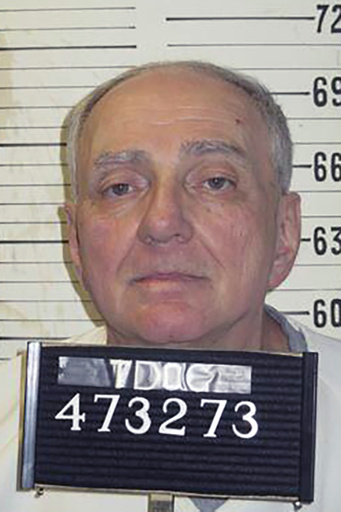
NASHVILLE, Tenn. — A prisoner on death row in Tennessee has initiated a hunger strike as of Wednesday, citing concerns over inadequate medical care, poor food quality, and potential safety risks associated with the individual padlocks on cell doors.
Howard Willis, who has been on death row since 2010, was convicted for the murders of newlyweds Adam Chrismer and Samantha Leming Chrismer in 2002. A friend of Willis, Darlene Kimbrough, confirmed that he had begun the hunger strike and subsequently sent a statement to the prison officials regarding his concerns.
Michael Rimmer, another inmate on death row who assists sick and disabled prisoners, received a copy of Willis’ statement and read it over the phone to Kimbrough, who recorded the conversation. Willis’ legal representation is aware of the content of the statement as well.
In his statement, the 73-year-old Willis expressed his dissatisfaction with a nurse at Riverbend Maximum Security Institution, claiming that her incompetence with medications had led to prisoners avoiding necessary treatments. He accused her of harassment and disrespect.
Rimmer described Willis as having untreated health issues for an extended period and suggested that he may have suffered a minor stroke, which has significantly impacted his cognitive functions.
Furthermore, Willis is opposing the recent implementation of padlocks on death row cell doors and the key-operated gates surrounding them, which he sees as creating safety hazards. He referenced a federal court ruling from 1985 that addressed similar safety issues in Tennessee, mandating the state to rectify problems surrounding central locking systems and fire drill protocols.
In addition to healthcare and safety concerns, Willis highlighted the low quality of meals served, which he claimed has made the hunger strike “not so difficult,” as relayed by Rimmer.
A representative from the Tennessee Department of Correction was not available for comment on Wednesday afternoon regarding the situation.
During his trial, Willis represented himself and has been striving for a new trial, asserting that his constitutional rights were violated. On January 22, his petition was denied by the Tennessee Court of Criminal Appeals, and his attorneys are now deliberating on their future course of action.
“In the time that we have represented Mr. Willis, we have become aware that inmates are struggling to receive a basic level of medical care,” stated attorney Josh Hedrick in an email. “We hope that Mr. Willis’s concerns are heard soon.”

